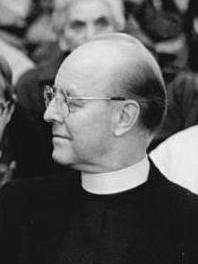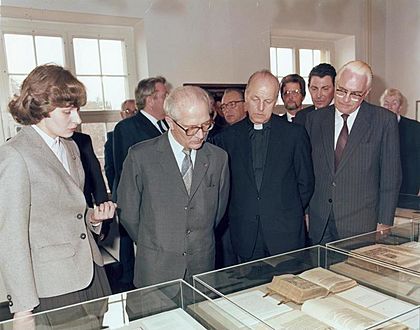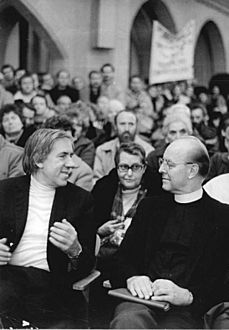Werner Leich facts for kids
Quick facts for kids
Werner Leich
|
|
|---|---|

Leich in 1989
|
|
| Born | 31 January 1927 Mühlhausen, Thuringia, Germany
|
| Died | 17 December 2022 (aged 95) Gotha, Thuringia, Germany
|
| Education | |
| Occupation |
|
| Awards |
|
Werner Leich (born January 31, 1927 – died December 17, 2022) was an important German church leader. He was a Protestant theologian and a pastor. From 1978 to 1992, he served as the longest-serving Landesbischof (a type of bishop) for the Lutheran Church in Thuringia. This was during the time when Germany was divided, and he lived in East Germany (also known as the German Democratic Republic or GDR). He helped the church stay independent from the government during a difficult period.
Contents
Early Life and Education
Werner Leich was born in Mühlhausen, Germany, on January 31, 1927. His father was a lawyer and a mayor. His mother was a teacher, but she passed away when he was only six months old. Werner grew up with his aunt and grandmother in Weimar. Later, his father remarried, and Werner joined his new family in Schalkau.
In 1939, his father lost his job as mayor because he disagreed with the Nazi party. He was then given a smaller job in Gotha. Werner went to the Ernestine-Gymnasium school there until 1942. In 1942, he left school early to join the German Luftwaffe (air force) as a volunteer. By 1945, he had become a Fahnenjunker, which is a type of officer cadet.
After World War II, Werner first trained to be a metalworker. He then returned to school and finished his Abitur (high school diploma) in 1946. In 1947, he started studying theology (the study of religious faith) at the University of Marburg. He finished his studies at the Heidelberg University from 1950 to 1951.
Professional Career and Church Leadership
In 1951, Werner Leich began his first job as a vicar (a type of pastor) in Angelroda. A year later, he married his wife, Trautel Sickert, and they had two children. In 1954, he became a pastor in Wurzbach.
From 1960, he was a member of the synod (a church council) of the Lutheran Church in Thuringia. He became the synod's vice-president from 1967 to 1978. Then, from 1978 to 1992, he served as the bishop of the Lutheran Church in Thuringia. He held this important position longer than anyone else during the time of East Germany (GDR).
In 1983, Werner Leich and Erich Honecker, the leader of East Germany, helped reopen the Wartburg castle after it was repaired. Leich also led the united Lutheran churches in the GDR from 1983 to 1986. He was also the president of the conference of Protestant church leaders in the GDR from 1986 to 1990.
Throughout his career, Leich worked to protect the right to worship God in a communist country that was often against religion. He once said that "a lot of times we did hide being Christians." He also supported ecumenism, which means working towards unity among different Christian churches.
Werner Leich strongly believed that the church should be independent from the government. On March 3, 1988, he met with Honecker and asked for social changes in East Germany. The Lutheran Church had become a place where people who disagreed with the government could express their views. After the spring of 1989, he stopped using the phrase "Kirche im Sozialismus" (Church in Socialism). He is remembered for supporting the Peaceful Revolution, which led to the end of communist rule in East Germany.
Personal Life and Legacy
Werner Leich retired in 1992. He wrote a book about his life called Wechselnde Horizonte. Mein Leben in vier politischen Systemen (Changing Horizons: My Life in Four Political Systems). He took care of his wife until she passed away in 2021.
Werner Leich died at a hospital in Gotha on December 17, 2022, at the age of 95, after a short illness.
Awards and Recognition
Werner Leich received several important awards for his work.
- In 1984, he received the Four Freedoms Award for the Freedom of Worship. This award recognizes people who have worked to protect basic freedoms.
- In 2005, he was given the Order of Merit of the Free State of Thuringia, which is a high honor from the state of Thuringia in Germany.
Images for kids
-
Reopening of the Wartburg castle; Erich Honecker (second from left) and Werner Leich, 1983.
 | DeHart Hubbard |
 | Wilma Rudolph |
 | Jesse Owens |
 | Jackie Joyner-Kersee |
 | Major Taylor |



